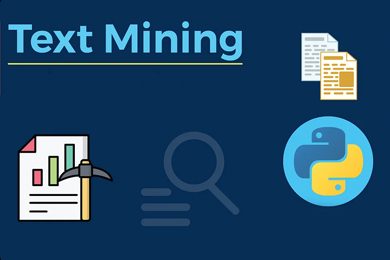This plan includes
- Limited free courses access
- Play & Pause Course Videos
- Video Recorded Lectures
- Learn on Mobile/PC/Tablet
- Quizzes and Real Projects
- Lifetime Course Certificate
- Email & Chat Support
What you'll learn?
- In this course the students will learn the basics of text mining and will build on it to perform document categorization, document grouping and subjective analysis.
- The code implementation is carried out in Python language, while Natural Language Processing (NLP) is used for pre-processing textual data.
- We will learn about structuring textual data using different representation schemes and tuning their parameters.
- Starting from a very small dummy dataset, we migrate to existing databases to build models and perform validation and evaluation on them.
- We will learn about scraping data from the web and converting it into a dataset.
- Sentiment analysis of user hotel reviews
- Information extraction from raw documents
Course Overview
In this course, we study the basics of text mining.
-
The basic operations related to structuring the unstructured data into vector and reading different types of data from the public archives are taught.
-
Building on it we use Natural Language Processing for pre-processing our dataset.
-
Machine Learning techniques are used for document classification, clustering and the evaluation of their models.
-
Information Extraction part is covered with the help of Topic modeling
-
Sentiment Analysis with a classifier and dictionary based approach
-
Almost all modules are supported with assignments to practice.
-
Two projects are given that make use of most of the topics separately covered in these modules.
-
Finally, a list of possible project suggestions is given for students to choose from and build their own project.
Pre-requisites
- Basics of programming (Any language, python is a bonus)
- Basic understanding of Machine Learning
- Can code with lists, loops and conditions and have basic understanding of models learning patterns from data
Target Audience
- Beginners in python and curious about data science
- Knows programming in Python and basic concepts of Data Science but cannot practically correlate the two.
Curriculum 68 Lectures 05:30:04
Section 1 : Introduction
Section 2 : Text Representation
- Lecture 1 :
- Representation schemes
- Lecture 2 :
- Representing one doc corpus
- Lecture 3 :
- Representing multidoc corpus
- Lecture 4 :
- TF-IDF
- Lecture 5 :
- Structuring dummy dataset
- Lecture 6 :
- Structuring UCI dataset
- Lecture 7 :
- Tuning parameters
Section 3 : Document Classification
- Lecture 1 :
- Machine Learning overview
- Lecture 2 :
- KNN Classifier
- Lecture 3 :
- NB Classifier
- Lecture 4 :
- DT Classifier
- Lecture 5 :
- Linear Classifier
- Lecture 6 :
- Concluding Remarks
- Lecture 7 :
- default setting classifiers
- Lecture 8 :
- classifers with parameters
- Lecture 9 :
- Classifiers with UCI dataset
Section 4 : Document Clustering
- Lecture 1 :
- Introduction to Clustering
- Lecture 2 :
- K-meansClustering
- Lecture 3 :
- ImplementationOfPartitionalClustering
- Lecture 4 :
- AgglomerativeClustering
- Lecture 5 :
- AgglomerativeClusteringParameters
- Lecture 6 :
- ClusteringUCIDataset
- Lecture 7 :
- SquaredError-and-number-of-Clusters
- Lecture 8 :
- PlottingSquarredError
Section 5 : Validation and Evaluation
- Lecture 1 :
- Cross Validation
- Lecture 2 :
- Classifiers Evaluation
- Lecture 3 :
- Clustering Evaluation Techniques
- Lecture 4 :
- Validation
- Lecture 5 :
- K-Fold Cross Validation
- Lecture 6 :
- Leave one out validation
- Lecture 7 :
- Predictive accuracy of a classifier with KFold
- Lecture 8 :
- Precision, recall and f1 score
- Lecture 9 :
- Confusion matrix
- Lecture 10 :
- allTogetherClassifiers
- Lecture 11 :
- Cluster Evaluation
Section 6 : Pre-processing
- Lecture 1 :
- Text Normalization
- Lecture 2 :
- Regular Expressions
- Lecture 3 :
- Lowercase, whitespaces, punctuations
- Lecture 4 :
- Stopwords removal
- Lecture 5 :
- StemmingLemmatization
- Lecture 6 :
- Regular expressions
- Lecture 7 :
- POS tagging
- Lecture 8 :
- data acquisition
- Lecture 9 :
- Segmentation and Tokenization
Section 7 : Topic Modeling
- Lecture 1 :
- Topic Modeling Introduction
- Lecture 2 :
- Plate notation
- Lecture 3 :
- Working of Topic Models
- Lecture 4 :
- Hyperparameters
- Lecture 5 :
- Topic Modeling Evaluation
- Lecture 6 :
- Topic Modeling Implementation
- Lecture 7 :
- Topic Modeling of UCI repository Dataset
- Lecture 8 :
- Hyper-parameters
- Lecture 9 :
- LDA online learning
- Lecture 10 :
- Perplexity
Section 8 : Sentiment Analysis
- Lecture 1 :
- Introduction
- Lecture 2 :
- Sentiment Analysis Techniques
- Lecture 3 :
- Levels of Analysis and Challenges
- Lecture 4 :
- WordNet
- Lecture 5 :
- Sentiment Classification
- Lecture 6 :
- WordNet based SA
- Lecture 7 :
- sentiWordnet
Section 9 : Project
- Lecture 1 :
- project1
- Lecture 2 :
- project2
- Lecture 3 :
- projectideas
Our learners work at
Frequently Asked Questions
How do i access the course after purchase?
It's simple. When you sign up, you'll immediately have unlimited viewing of thousands of expert courses, paths to guide your learning, tools to measure your skills and hands-on resources like exercise files. There’s no limit on what you can learn and you can cancel at any time.Are these video based online self-learning courses?
Yes. All of the courses comes with online video based lectures created by certified instructors. Instructors have crafted these courses with a blend of high quality interactive videos, lectures, quizzes & real world projects to give you an indepth knowledge about the topic.Can i play & pause the course as per my convenience?
Yes absolutely & thats one of the advantage of self-paced courses. You can anytime pause or resume the course & come back & forth from one lecture to another lecture, play the videos mulitple times & so on.How do i contact the instructor for any doubts or questions?
Most of these courses have general questions & answers already covered within the course lectures. However, if you need any further help from the instructor, you can use the inbuilt Chat with Instructor option to send a message to an instructor & they will reply you within 24 hours. You can ask as many questions as you want.Do i need a pc to access the course or can i do it on mobile & tablet as well?
Brilliant question? Isn't it? You can access the courses on any device like PC, Mobile, Tablet & even on a smart tv. For mobile & a tablet you can download the Learnfly android or an iOS app. If mobile app is not available in your country, you can access the course directly by visting our website, its fully mobile friendly.Do i get any certificate for the courses?
Yes. Once you complete any course on our platform along with provided assessments by the instructor, you will be eligble to get certificate of course completion.
For how long can i access my course on the platform?
You require an active subscription to access courses on our platform. If your subscription is active, you can access any course on our platform with no restrictions.Is there any free trial?
Currently, we do not offer any free trial.Can i cancel anytime?
Yes, you can cancel your subscription at any time. Your subscription will auto-renew until you cancel, but why would you want to?
Instructor

58662 Course Views
1 Courses



 Tech & IT
Tech & IT
 Business
Business
 Coding & Developer
Coding & Developer
 Finance & Accounting
Finance & Accounting
 Academics
Academics
 Office Applications
Office Applications
 Art & Design
Art & Design
 Marketing
Marketing
 Health & Wellness
Health & Wellness
 Sounds & Music
Sounds & Music
 Lifestyle
Lifestyle
 Photography
Photography













